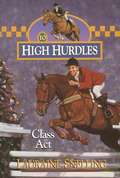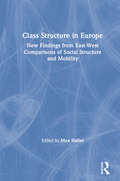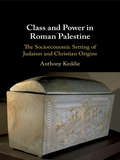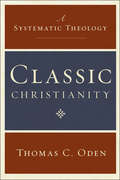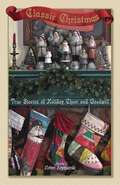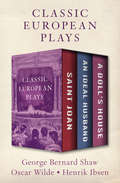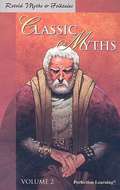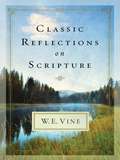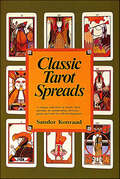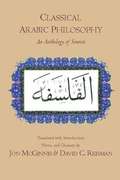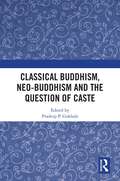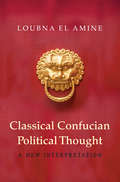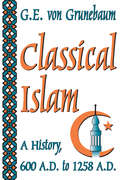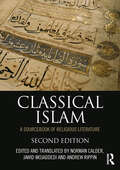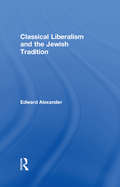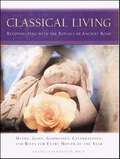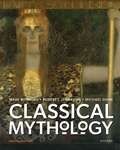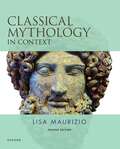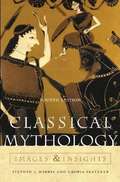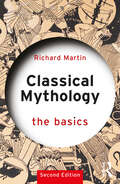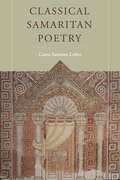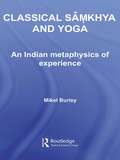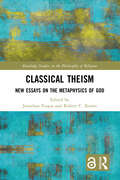- Table View
- List View
Class Act (High Hurdles #10)
by Lauraine SnellingWith the support of her family and friends, DJ undertakes the long and difficult process of recovery from the serious burns she received while saving horses from a deadly fire, but she is afraid she may never ride again.
Class Structure in Europe: New Findings from East-West Comparisons of Social Structure and Mobility
by Max HallerIs there a typical European class structure? Have power patterns left any imprint in the European societies of today? Has the experience of socialist revolution in Eastern Europe created a distinctive social-structural pattern in that part of the continent? These are only a few of the questions taken up by the contributors to this collection of case studies and comparative research.
Class and Power in Roman Palestine: The Socioeconomic Setting of Judaism and Christian Origins
by Anthony KeddieAnthony Keddie investigates the changing dynamics of class and power at a critical place and time in the history of Judaism and Christianity - Palestine during its earliest phases of incorporation into the Roman Empire (63 BCE–70 CE). He identifies institutions pertaining to civic administration, taxation, agricultural tenancy, and the Jerusalem Temple as sources of an unequal distribution of economic, political, and ideological power. Through careful analysis of a wide range of literary, documentary, epigraphic, and archaeological evidence, including the most recent discoveries, Keddie complicates conventional understandings of class relations as either antagonistic or harmonious. He demonstrates how elites facilitated institutional changes that repositioned non-elites within new, and sometimes more precarious, relations with privileged classes, but did not typically worsen their economic conditions. These socioeconomic shifts did, however, instigate changing class dispositions. Judaean elites and non-elites increasingly distinguished themselves from the other, through material culture such as tableware, clothing, and tombs.
Classic Christianity
by Thomas C. OdenFor the first time, Thomas Oden's Systematic Theology classic series (individually titled The Living God, The Word of Life, and Life in the Spirit) is available in one complete volume. A renowned theologian, Oden provides a consensus view of the Christian faith, delving deeply into ancient Christian tradition and bringing to the contemporary church the best wisdom from its past. In this magisterial work, Oden tackles the central questions of Christian belief and the nature of the trinity. Written for clergy, Christian educators, religious scholars, and lay readers alike, Classic Christianity provides the best synthesis of the whole history of Christian thought. Part one explores the most intriguing questions of the study of God--Does God exist? Does Jesus reveal God? Is God personal, compassionate, free?--and presents answers that reflect the broad consensus culled from the breadth of the church's teachers. It is rooted deeply and deliberately in scripture but confronts the contemporary mind with the vitality of the Christian tradition. Part two addresses the perplexing Christological issues of whether God became flesh, whether God became Christ, and whether Christ is the source of salvation. Oden details the core beliefs concerning Jesus Christ that have been handed down for the last two hundred decades, namely, who he was, what he did, and what that means for us today. Part three examines how the work of God in creation and redemption is being brought to consummation by the Holy Spirit in persons, through communities, and in the fullness of human destiny. Oden's magisterial study not only treats the traditional elements of systematical theology but also highlights the foundational exegetes throughout history. Covering the ecumenical councils and early synods; the great teachers of the Eastern church tradition, including Athanasius and John Chrysostom; and the prominent Western figures such as Augustine, Ambrose, Thomas Aquinas, Martin Luther, and John Calvin, this book offers the reader the fullest understanding of the Christian faith available.
Classic Christianity
by Thomas C. OdenFor the first time, Thomas Oden's Systematic Theology classic series (individually titled The Living God, The Word of Life, and Life in the Spirit) is available in one complete volume. A renowned theologian, Oden provides a consensus view of the Christian faith, delving deeply into ancient Christian tradition and bringing to the contemporary church the best wisdom from its past. In this magisterial work, Oden tackles the central questions of Christian belief and the nature of the trinity. Written for clergy, Christian educators, religious scholars, and lay readers alike, Classic Christianity provides the best synthesis of the whole history of Christian thought. Part one explores the most intriguing questions of the study of God--Does God exist? Does Jesus reveal God? Is God personal, compassionate, free?--and presents answers that reflect the broad consensus culled from the breadth of the church's teachers. It is rooted deeply and deliberately in scripture but confronts the contemporary mind with the vitality of the Christian tradition. Part two addresses the perplexing Christological issues of whether God became flesh, whether God became Christ, and whether Christ is the source of salvation. Oden details the core beliefs concerning Jesus Christ that have been handed down for the last two hundred decades, namely, who he was, what he did, and what that means for us today. Part three examines how the work of God in creation and redemption is being brought to consummation by the Holy Spirit in persons, through communities, and in the fullness of human destiny. Oden's magisterial study not only treats the traditional elements of systematical theology but also highlights the foundational exegetes throughout history. Covering the ecumenical councils and early synods; the great teachers of the Eastern church tradition, including Athanasius and John Chrysostom; and the prominent Western figures such as Augustine, Ambrose, Thomas Aquinas, Martin Luther, and John Calvin, this book offers the reader the fullest understanding of the Christian faith available.
Classic Christmas: True Stories of Holiday Cheer and Goodwill
by Helen SzymanskiIf you are trying to rediscover the traditional joys of yuletide celebrations, then look no further. Classic Christmas is a stirring collection of more than seventy true-life stories that chronicle the simpler delights of the season. These touching tales include: Mama's Gift, a story of a grieving young woman comforted by the arrival of a Christmas gift from her mother, several days after her death; Lighting of the Tree, in which the townspeople of a tropical paradise find the Christmas spirit, despite the palm trees and warm weather.
Classic European Plays: Saint Joan, An Ideal Husband, and A Doll's House
by George Bernard Shaw Henrik Ibsen Oscar WildeThese three timeless plays showcase the sparkling wit and provocative intellect of some of modern drama&’s greatest playwrights.Saint Joan by George Bernard Shaw: This complex drama depicts the life of Joan of Arc—from her childhood vision calling her to lead the French army against the English in the Hundred Years War through her eventual capture, trial, and burning at the stake. An epilogue depicts a retrial that clears Joan of heresy, declaring her a Christian martyr.An Ideal Husband by Oscar Wilde: In this timeless drawing room comedy, a blackmail scheme forces a married couple to reexamine their moral standards—providing a wry commentary on the hypocrisy of politicians. Carried along by nonstop witty repartee, this is satirical theater at its finest.A Doll&’s House by Henrik Ibsen: This quintessential work of dramatic realism depicts one woman&’s struggle against patriarchal society. The central character&’s rejection of a smothering marriage shocked theatergoers of the late nineteenth century while the play&’s pioneering style set the stage for twentieth century domestic drama.
Classic Myths, Volume 2 (Retold Myths & Folktales)
by Perfection LearningAnthology of classic myths for readers in grades 6-12; includes "Achilles and Hector," "Antigone," "Oedipus," "The Theft of Persephone," "The Trojan Horse," and others.
Classic Reflections on Scripture
by W. E. VineGrow in your faith with selections from W. E. Vine's collected works. Presented in an updated style, the themed studies found in Classic Reflections on Scripture from W. E. Vine make sound theological studies on the New Testament accessible for pastors and Bible students of all levels. Short discussions are written in a friendly style that will enhance individual and small group Bible study. Features include:Reflections from one of the most renowned Christian theologians of the 20th centuryTopical studies on the mystery of Scripture, the authority of the Bible, the women of the book of Revelation, and much moreUpdated, accessible language
Classic Tarot Spreads
by Sandor KonraadClassic Tarot Spreads presents one of the most comprehensive collections of card spreads available in one book. It includes 22 classic spreads that provide a key to the history, mythology and metaphysical meanings of the cards. The book not only covers the practice and ritual of card reading, it treats the Tarot deck as a magical tool and counseling medium that can be used to resolve basic life issues. Sandor Konraad includes spreads for opening a reading - answering questions about health, love, marriage and money - as well as spreads for ending a reading.
Classical Arabic Philosophy: An Anthology of Sources
by Jon Mcginnis David C. ReismanThis volume introduces the major classical Arabic philosophers through substantial selections from the key works (many of which appear in translation for the first time here) in each of the fields--including logic, philosophy of science, natural philosophy, metaphysics, ethics, and politics--to which they made significant contributions. An extensive Introduction situating the works within their historical, cultural, and philosophical contexts offers support to students approaching the subject for the first time, as well as to instructors with little or no formal training in Arabic thought. A glossary, select bibliography, and index are also included.
Classical Buddhism, Neo-Buddhism and the Question of Caste
by Pradeep P. GokhaleThis book examines the interface between Buddhism and the caste system in India. It discusses how Buddhism in different stages, from its early period to contemporary forms—Theravāda, Mahāyāna, Tantrayāna and Navayāna—dealt with the question of caste. It also traces the intersections between the problem of caste with those of class and gender. The volume reflects on the interaction between Hinduism and Buddhism: it looks at critiques of caste in the classical Buddhist tradition while simultaneously drawing attention to the radical challenge posed by Dr B. R. Ambedkar’s Navayāna Buddhism or neo-Buddhism. The essays in the book further compare approaches to varṇa and caste developed by modern thinkers such as M. K. Gandhi and S. Radhakrishnan with Ambedkar’s criticisms and his departures from mainstream appraisals. With its interdisciplinary methodology, combining insights from literature, philosophy, political science and sociology, the volume explores contemporary critiques of caste from the perspective of Buddhism and its historical context. By analyzing religion through the lens of caste and gender, it also forays into the complex relationship between religion and politics, while offering a rigorous study of the textual tradition of Buddhism in India. This book will be useful to scholars and researchers of Indian philosophy, Buddhist studies, Indology, literature (especially Sanskrit and Pāli), exclusion and discrimination studies, history, political studies, women studies, sociology, and South Asian studies.
Classical Confucian Political Thought
by Loubna El AmineThe intellectual legacy of Confucianism has loomed large in efforts to understand China's past, present, and future. While Confucian ethics has been thoroughly explored, the question remains: what exactly is Confucian political thought? Classical Confucian Political Thought returns to the classical texts of the Confucian tradition to answer this vital question. Showing how Confucian ethics and politics diverge, Loubna El Amine argues that Confucian political thought is not a direct application of Confucian moral philosophy. Instead, contrary to the conventional view that Confucian rule aims to instill virtue in all members of society, El Amine demonstrates that its main aim is to promote political order.El Amine analyzes key aspects of the Confucian political vision, including the relationship between the ruler and the people, the typology of rulers, and the role of ministers and government officials. She also looks at Confucianism's account of the mechanisms through which society is to be regulated, from welfare policies to rituals. She explains that the Confucian conception of the political leaves space open for the rule of those who are not virtuous if these rulers establish and maintain political order. She also contends that Confucians defend the duty to take part in government based on the benefits that such participation can bring to society.Classical Confucian Political Thought brings a new understanding to Confucian political theory by illustrating that it is not chiefly idealistic and centered on virtue, but rather realistic and driven by political concerns.
Classical Islam: A History, 600 A.D. to 1258 A.D.
by G. E. von GrunebaumIn a book written with the poignancy and beauty appropriate to its subject matter, the author opens by reminding us that the essence of a society is in a sense identical with its history. Classical Islam also serves as a reminder that in the case of Islam, despite its triumphs on the fields of battle, telling its history is the only way open to us to render that essence accessible and show it from all sides. The work offers a grand narrative of a faith that offers an interpretation of the world, a way of life, and a style of thinking, that goes far beyond institutional or political supports. The relevance of this historical perspective is beyond dispute. The period from 610 A.D. when Muhammad received his call until the conquest of Baghdad by the Mongols in 1258 is known as the classical period of Islam. This was the period of the great expansion of Islam both as a political structure and as a religious and intellectual community. It established the base for the development of the high Islamic civilization of North Africa, the Near East, Persia, and India, as well as further expansion of the Islamic religious and intellectual community throughout the world. This book presents an authoritative history of the period written by one of the world's leading experts on the subject.Classical Islam examines the relationships, both cultural and political, between the Islamic world and the Mediterranean countries and India and elaborates on the economic, social, and intellectual factors and forces that shaped the Muslim world and molded its interactions with infidels. The work is written in a clear and direct narrative form, emphasizing simultaneously the major intellectual trends and the political events and tendencies of the formative period in Islamic history that still resonates today.
Classical Islam: A Sourcebook of Religious Literature
by Andrew Rippin Jawid MojaddediThis definitive sourcebook presents more than sixty authoritative new translations of key Islamic texts. Edited and translated by three leading specialists, Classical Islam features eight thematically-linked sections covering the Qur'ān and its interpretation, the life of Muhammad, hadīth, law, theology, mysticism and Islamic history. The new edition has been expanded to cover a fuller range of material illustrating the growth of Islamic thought from its seventh-century origins through to the end of the medieval period. It includes illustrations, a glossary, extensive bibliography and explanatory prefaces for each text. Classical Islam is an essential resource for the study of early and medieval Islam and its legacy.
Classical Liberalism and the Jewish Tradition
by Edward AlexanderThe incongruence if not antagonism between modern liberalism and the Jewish sense of the world has been most notably articulated by Lionel Trilling. Certainly the imaginative limitations and intellectual smugness he discerned in his own ideological party found a parallel, in his view, in the embrace of liberalism by the American Jewish community. The consequences of that embrace entail both a superficial intellectual and religious culture and a misunderstanding of the social and political dimensions of Judaism. In Classical Liberalism and the Jewish Tradition, Edward Alexander engages in a wide-ranging exploration of the roots of the fundamental antagonism between liberalism and Jewish tradition from the nineteenth century to the present day.Central to Alexander's arguments is his incisive critique of the distortion of modern Judaism as a child of the Enlightenment and the notion that specifically Jewish concerns, whether with Zionism, the Holocaust, or sacred and secular writings, constitute a narrow and parochial betrayal of liberal interests. The chapters are divided among political, religious, and literary subjects. The opening chapter on Mill's ambivalent attitude toward the Jews establishes terms of conflict between Judaism and liberal secularism and universality as do chapters on the antisemitism of Thomas Arnold and Marx and the more ambiguous Jewish self-identification of Disraeli.Alexander examines such disparate topics as the hostility to the idea of a Jewish state on the part of numerous Israeli intellectuals, the disdain among liberals toward the specifically Jewish dimension of the Holocaust, and the capitulation of the Modern Language Association to the anti-Zionism of Edward Said. Turning to the uneasy status of Jewish religious texts and secular literature as sources of cultural revitalization, Alexander deals with the attempt by the Israeli scholar Adin Steinsaltz to bring the Talmud to the attention of contemporary Jewish readers and includes a chapter on his nineteenth-century precursor Emanuel Deutsch and his relationship to George Eliot. An analysis of Ruth Wisse's efforts to establish a modern Jewish literary canon is rounded out by chapters on two of the major figures of that canon: Isaac Bashevis Singer and Philip Roth.While diverse in subject matter, Classical Liberalism and the Jewish Tradition is consistent in its unapologetic advocacy of a Jewish point of view and in its depth of scholarship in tracing the historical roots of contemporary attitudes and ideologies.
Classical Living: Reconnecting with the Rituals of Ancient Rome
by Frances BernsteinEnhance your life using the riches of the Roman tradition. An authority on ancient Roman culture, Frances Bernstein shows you how to draw on the wisdom, history, myths and ancient prayers that were a part of everyday Roman life to achieve abundance and serenity in your own. This beautiful volume combines delectable recipes such as fava bean salad for good digestion and a healthy body with rituals such as water healing in a luxurious bath to nurture oneself and to honor the deities who rule each month. As the author illustrates, "Sexuality, fertility, nature, and spirituality were so closely interwoven in antiquity that it was difficult for the ancient pagan to imagine them apart."From autumn's introspective thresholds and winter's purification rituals to the warm fullness of spring and the bittersweet heat of summer, Bernstein shares stories of ancient Roman practices and festivals and offers modern rituals to help you create meaningful, new traditions of your own. In January, give gifts of warm honey cake to banish darkness, instill good will, and bring about harmonious relationships. Honor Bacchus, the god of March, and Liberalia with a rustic wine tasting, and celebrate Venus, the goddess of April, with a sensuous bath brimming with floating rose petals. Remember the fate of Adonis in July with celebrations of renewal, or design a sacred landscape in your garden with fountains, bells, altars, and blossoming flowers to please the goddess Flora.With poetry, wisdom, and historical insight, Frances Bernstein offers Roman traditions and rituals for modern spiritual practice, making Classical Living an inviting source to treasure throughout the year.
Classical Mythology
by Robert J. Lenardon Michael Sham Mark MorfordBuilding on the best-selling tradition of previous editions, Classical Mythology, Twelfth Edition, is the most comprehensive survey of classical mythology available―and the first full-color textbook of its kind. Featuring the authors' clear and extensive translations of original sources, it brings to life the myths and legends of Greece and Rome in a lucid and engaging style. The text contains a wide variety of faithfully translated passages from Greek and Latin sources, including Homer, Hesiod, all the Homeric Hymns, Pindar, Aeschylus, Sophocles, Euripides, Herodotus, Plato, Lucian, Lucretius, Vergil, Ovid, and Seneca. The acclaimed author team incorporates a dynamic combination of poetic narratives and enlightening commentary to make the myths come alive for students. Offering historical and cultural background, they also examine the enduring survival of classical mythology and its influence in the fields of art, literature, music, dance, and film.
Classical Mythology In Context
by Lisa MaurizioClassical Mythology in Context provides a contextualized treatment of classical myth, combining ancient sources, comparative perspectives, theoretical approaches, and artistic interpretations. It encourages students to directly encounter and explore ancient myths and to understand them in broader interpretative contexts. It features a modular structure that coincides with the four main components of a classical mythology course: history, theory, comparison, and reception.
Classical Mythology: Images and Insights, Fourth Edition
by Gloria Platzner Stephen L. HarrisAn introduction to Greek and Roman mythology combining theoretical treatment of myth with primary literature and art. Incorporates selections and complete works of Greco-Roman myths such as Hesiod's Theogony, the Homeric hymns, and Ovid's Metamorphoses, with critical introductions and discussion and review questions. Discusses Greek myth's concepts and divinities, contrasts Greek and Roman myth, modern art and literature incorporating mythology. Includes a separate chapter devoted to the Great Goddess. Annotation c. by Book News, Inc., Portland, Or.
Classical Mythology: The Basics (The Basics)
by Richard MartinThis new edition introduces the core elements of ancient Greek and Roman narratives about immortal gods and heroic humans. It explains how myths once shaped ancient ways of thinking, and how they have fascinated and inspired artists, writers, musicians, scientists, and scholars since. In six clear and concise chapters, this book explains what myths are, sketches the main stories about divinities, heroes and heroines, and explores through specific case studies the ways in which they influenced modern culture, from Renaissance opera to contemporary video games and social movements. The second edition also features a new chapter analyzing how myths have been used in politics from antiquity to the present day. More than two dozen illustrations, maps, and charts complement the text. No prior knowledge of mythology is assumed, and the book incorporates the latest scholarship on classical mythology, providing annotated lists of further readings. Anyone who has encountered Greek or Roman myths in literature, art, or pop culture and wants to know more about the cultural contexts for the stories will benefit from this compact book. Intended for a wide readership, the second edition of Classical Mythology: The Basics continues to off er a clear introduction to the subject for undergraduates, scholars, and the general reader.
Classical Samaritan Poetry
by Laura Suzanne LieberThis book introduces the evocative but largely unknown tradition of Samaritan religious poetry from late antiquity to a new audience. These verses provide a unique window into the Samaritan religious world during a formative period.Prepared by Laura Suzanne Lieber, this anthology presents annotated English translations of fifty-five Classical Samaritan poems. Lieber introduces each piece, placing it in context with Samaritan religious tradition, the geopolitical turmoil of Palestine in the fourth century CE, and the literary, liturgical, and performative conventions of the Eastern and Western Roman Empires, shared by Jews, Christians, and polytheists. These hymns, composed by three generations of poets—the priest Amram Dara; his son, Marqah; and Marqah’s son, Ninna, the last poet to write in Samaritan Aramaic in the period prior to the Muslim conquest—for recitation during the Samaritan Sabbath and festival liturgies remain a core element of Samaritan religious ritual to the present day.Shedding important new light on the Samaritans’ history and on the complicated connections between early Judaism, Christianity, the Samaritan community, and nascent Islam, this volume makes an important contribution to the reception of the history of the Hebrew Bible. It will appeal to a wide audience of students and scholars of the Hebrew Bible, the New Testament, early Judaism and early Christianity, and other religions of late antiquity.
Classical Samaritan Poetry
by Laura Suzanne LieberThis book introduces the evocative but largely unknown tradition of Samaritan religious poetry from late antiquity to a new audience. These verses provide a unique window into the Samaritan religious world during a formative period.Prepared by Laura Suzanne Lieber, this anthology presents annotated English translations of fifty-five Classical Samaritan poems. Lieber introduces each piece, placing it in context with Samaritan religious tradition, the geopolitical turmoil of Palestine in the fourth century CE, and the literary, liturgical, and performative conventions of the Eastern and Western Roman Empires, shared by Jews, Christians, and polytheists. These hymns, composed by three generations of poets—the priest Amram Dara; his son, Marqah; and Marqah’s son, Ninna, the last poet to write in Samaritan Aramaic in the period prior to the Muslim conquest—for recitation during the Samaritan Sabbath and festival liturgies remain a core element of Samaritan religious ritual to the present day.Shedding important new light on the Samaritans’ history and on the complicated connections between early Judaism, Christianity, the Samaritan community, and nascent Islam, this volume makes an important contribution to the reception of the history of the Hebrew Bible. It will appeal to a wide audience of students and scholars of the Hebrew Bible, the New Testament, early Judaism and early Christianity, and other religions of late antiquity.
Classical Samkhya and Yoga: An Indian Metaphysics of Experience (Routledge Hindu Studies Series)
by Mikel BurleySamkhya and Yoga are two of the oldest and most influential systems of classical Indian philosophy. This book provides a thorough analysis of the systems in order to fully understand Indian philosophy. Placing particular emphasis on the metaphysical schema which underlies both concepts, the author adeptly develops a new interpretation of the standard views on Samkhya and Yoga. Drawing upon existing sources and using insights from both Eastern and Western philosophy and religious practice, this comprehensive interpretation is respectful to the underlying spiritual purpose of the Indian systems. It serves to illuminate the relation between the theoretical and practical dimensions of Samkhya and Yoga. The book fills a gap in current scholarship and will be of interest to those concerned with Indology as well as philosophies in general and their similarities and differences with other traditions.
Classical Theism: New Essays on the Metaphysics of God (Routledge Studies in the Philosophy of Religion)
by Robert C. Koons Jonathan FuquaThis volume provides a contemporary account of classical theism. It features 17 original essays from leading scholars that advance the discussion of classical theism in new and interesting directions. It’s safe to say that classical theism—the view that God is simple, omniscient, and the greatest possible being—is no longer the assumed view in analytic philosophy of religion. It is often dismissed as being rooted in outdated metaphysical systems of the sort advanced by ancient and medieval philosophers. The main purpose of this volume is twofold: to provide a contemporary account of what classical theism is and to advance the scholarly discussion about classical theism. In Section I, the contributors offer a clear and cutting-edge account of the nature and existence of the God and the historical and theological foundations of classical theism. Section II contains chapters on a variety of topics, such as whether classical theism’s doctrine of simplicity needs revision, whether simplicity is compatible with the Christian doctrine of the Incarnation, and whether the hypothesis of a multiplicity of divine ideas is consistent with divine simplicity, among others. Classical Theism will appeal to scholars and advanced students in the philosophy of religion who are interested in the nature of God.
